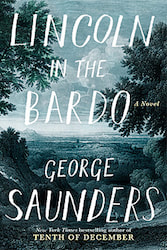
By now, you’ve probably heard that this year’s Man Booker prize winner is Lincoln in the Bardo, by George Saunders. Saunders’s novel is his first, although he’s written short fiction for many years, so it’s decidedly not a debut book.
If you’re unfamiliar with the premise, it’s a bit hard to explain. It takes place on one night in February of 1862. President Abraham Lincoln’s 11-year-old son Willie has died two days ago from typhoid fever and the funeral has just taken place.
Overcome with grief, Lincoln visits the tomb twice to grieve privately over his beloved son’s body. But here’s where it gets weird. Willie is in “the Bardo,” – the Tibetan idea of a “location” between this life and the afterlife. And the book is the stories of all the people there with Willie. Some have also just recently died; some have been there for years. The novel is as much their stories as it is the narrative of Lincoln’s grief over his lost son.
The book has 166 different narrative voices. Many are other people in the Bardo–ghosts, if you will–who refuse to admit or even consider that they are dead. They can’t even bring themselves to talk about bodies or coffins, but call them “sick-forms” and “sick-boxes,” as if they may still recover and return to the “previous” place.
The book also has chapters that are sequences of quotations about Lincoln, his presidency, and the tragedy of Willie’s illness and death. Many are actual scholarly sources; some are fictional.
With that many voices in the book, I had to read it in conjunction with the audiobook, which is narrated by an enormous cast of voices. It’s the only way to appreciate the technique Saunders is using to its fullest, and it was a delightful experience.
I don’t pretend to understand everything that occurs. It would take several readings for me to piece it all together. It’s about grief, guilt, resolve, acceptance, sin, and so many other elements. Despite challenges of such a narrative, and despite the absolutely bizarre premise, it was a compelling read. Of the three titles I read of the six on the Booker shortlist (the other two were Exit West, by Mohsin Hamid, and 4 3 2 1, by Paul Auster), Lincoln in the Bardo would have been my clear choice. I’m not sure I’d want a steady diet of such experimentation, but I thoroughly enjoyed my dip into it.
If you’re unfamiliar with the premise, it’s a bit hard to explain. It takes place on one night in February of 1862. President Abraham Lincoln’s 11-year-old son Willie has died two days ago from typhoid fever and the funeral has just taken place.
Overcome with grief, Lincoln visits the tomb twice to grieve privately over his beloved son’s body. But here’s where it gets weird. Willie is in “the Bardo,” – the Tibetan idea of a “location” between this life and the afterlife. And the book is the stories of all the people there with Willie. Some have also just recently died; some have been there for years. The novel is as much their stories as it is the narrative of Lincoln’s grief over his lost son.
The book has 166 different narrative voices. Many are other people in the Bardo–ghosts, if you will–who refuse to admit or even consider that they are dead. They can’t even bring themselves to talk about bodies or coffins, but call them “sick-forms” and “sick-boxes,” as if they may still recover and return to the “previous” place.
The book also has chapters that are sequences of quotations about Lincoln, his presidency, and the tragedy of Willie’s illness and death. Many are actual scholarly sources; some are fictional.
With that many voices in the book, I had to read it in conjunction with the audiobook, which is narrated by an enormous cast of voices. It’s the only way to appreciate the technique Saunders is using to its fullest, and it was a delightful experience.
I don’t pretend to understand everything that occurs. It would take several readings for me to piece it all together. It’s about grief, guilt, resolve, acceptance, sin, and so many other elements. Despite challenges of such a narrative, and despite the absolutely bizarre premise, it was a compelling read. Of the three titles I read of the six on the Booker shortlist (the other two were Exit West, by Mohsin Hamid, and 4 3 2 1, by Paul Auster), Lincoln in the Bardo would have been my clear choice. I’m not sure I’d want a steady diet of such experimentation, but I thoroughly enjoyed my dip into it.
 RSS Feed
RSS Feed
